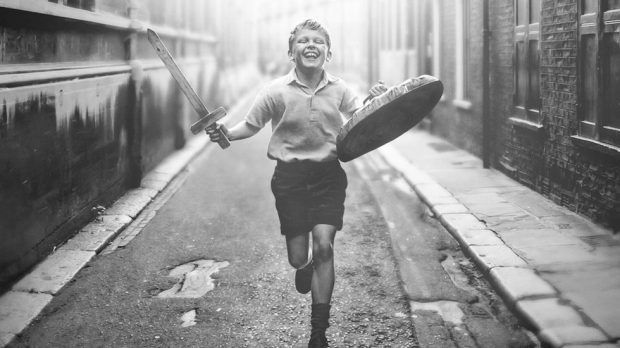
Directed by Kenneth Branagh
Starring Jude Hill, Caitríona Balfe, Jamie Doran, Ciarán Hinds, Judi Dench
This predominantly black and white comedy drama set in the 1960s sees the start of The Troubles through the eyes of a young boy seeing his neighbourhood torn apart. Nine year old Protestant Buddy (Jude Hill) tries to make sense of the violence and tension he sees on the streets around him, while at the same time trying to understand the problems facing his Ma (Caitríona Balfe) and Pa (Jamie Doran), and dealing with first love (with some advice from his grandparents played by Ciarán Hinds and Judi Dench).
Belfast should slip into sentimentality and mawkishness, but this coming-of-age tale set among The Troubles manages to skirt this and feel genuine. In part this is because of the personal nature of the story to director Kenneth Branagh, with the semi-autobiographical nature of the work lending it some veracity. By centering it on the idealised point of view of a boy growing up in the turmoil, Branagh is not beholden to explore the nuances of the conflict, or the history, but instead presents it in black and white terms as part of the background of a childhood life. The unrest is as confusing and strange as much of adult life, yet seen both through a slowly growing comprehension, in part shaped through the pop culture of the era, and the influence of family.
To do this Branagh concentrates on conveying a sense of period, place, and people – managing to achieve this spectacularly. His opening sequence gives us a guided tour of the neighbourhood, showing us the characters, and casting us back in time (albeit through the somewhat romanticised and nostalgic lens of childhood) before plunging us into a tense riot. It is a shockingly effective opener, setting the scene well for the rest of the film. We immediately see the effect, and have a good sense of the tension that follows.
It is against this backdrop that most of what follows is set, which is great staging. It dovetails nicely into the limited vision of a child’s experience, and cements the allure of community versus the rising tension versus the threat of having to move to an unknown country all front and centre to the audience. In its limited scope, Belfast never lets up from this balance, showing us the joy of life that Buddy gets, through the support of his friends, neighbours, and family, yet pairing it with a growing sense of impending change, a looming “fork in the road” which terrifies his young mind.
At just over an hour and a half, Belfast doesn’t outstay its welcome. This isn’t an exhaustive or challenging look into The Troubles, but it was never meant to be. Nor does it make light of the serious matter, instead giving us a child’s eye view of life running parallel to strife. It may pull at the heartstrings, but it is sentiment that comes from a genuine place.
DAVID O’CONNELL